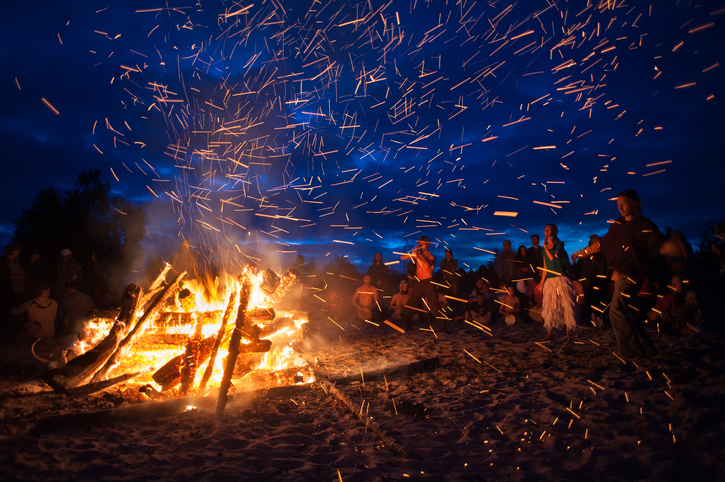11 dos and don’ts to help keep people, animals, and property safe this Bonfire Night

Authored by Aviva
Aviva data shows an increase in claims for fire damage from bonfires, fireworks and sparklers in November. Last year, claims increased by 300% when compared to October. One claim amounted to a staggering £234,000 after a firework hit the roof of a property resulting in extensive fire damage. A number of claims were due to pet dogs or cats being spooked by fireworks, resulting in smashed TVs, broken headphones, and a broken laptop.
With Bonfire Night just around the corner, Aviva is cautioning residents to take extra care during celebrations.
Aviva data shows an increase in claims for fire damage from bonfires, fireworks and sparklers in and around November. Last year, claims increased by 300% compared to October.
Claims from across the Bonfire Night period include fire damage to a shed from a bonfire left unattended, resulting in the loss of numerous expensive tools, ash damage to cars from bonfire embers, a melted conservatory roof after it was hit by a firework, and extensive fire damage to a property after a firework hit the roof, with the claim amounting to a staggering £234,000.
Fireworks were also responsible for damage to the interiors of homes, including a scorched bedroom carpet after a firework came through a bedroom window and a blown off letterbox when a firework was put through it maliciously.
We encourage people to take extra care on Bonfire Night so their evening stays enjoyable. Putting away garden furniture, keeping an eye out for stray fireworks or embers, and keeping pets indoors away from expensive items.
Hazel Johnson, Director of Home and Motor Claims at Aviva
But it isn’t just fire claims, Aviva data also show a number of incidents where pet dogs or cats were spooked by the noise of fireworks, resulting in smashed TVs, broken headphones, and a broken laptop, with the largest claim amounting to £2,324.
Hazel Johnson, Director of Home and Motor Claims at Aviva, says: “While Bonfire Night is usually a time of celebration, for some people the night can quite literally go up in smoke. Aviva claims data shows that we tend to see an increase in home insurance claims for fire damage across November, with Bonfire Night topping the table for incidents of fire.
“It isn’t just rogue fireworks or out of control bonfires where the risk lies. Several claimants report fire damage from bonfire embers as well as leaving burnt out bonfires unattended only to discover they were still hot enough to start a substantial fire. Multiple claimants have even reported damage to expensive gadgets from pets spooked by fireworks.
“We encourage people to take extra care on Bonfire Night so their evening stays enjoyable, putting away garden furniture, keeping an eye out for stray fireworks or embers, and keeping pets indoors away from expensive items. If people are planning to have a bonfire or light fireworks and sparklers at home, we urge them to take proper safety measures and never leave a bonfire unattended.”
Aviva has issued a list of dos and don’ts to help keep people, animals, and property safe this Bonfire Night
If you plan to have fireworks display at home, make sure your fireworks carry the CE mark.Be careful where you aim fireworks, particularly those which shoot into the air, like rockets. Make sure they’re directed away from people, trees, buildings, and roads, and never, ever throw them.Keep fireworks in a closed tin and never carry them in pockets.Don’t leave your bonfire unattended. Fires can get out of control in seconds, so make sure someone is watching over your blaze at all times and go easy with accelerants. Even if a bonfire looks like it has gone out, it could still be hot enough to cause damage. Be careful with what you burn. You should only burn dry materials such as wood and dry leaves. Bonfires should not be used to get rid of household waste such as plastic packaging and you shouldn’t burn aerosols, tyres, painted or treated wood, or anything containing paint or foam.Watch the weather. Windy conditions can spread fires quickly over a large area. Flames and embers can stray into neighbouring properties and Aviva data shows fires can often start at a different address to where the bonfire is taking place.Take care when disposing of cinders and matches. Ashes can stay hot for hours after a fire appears to have gone out. Aviva has seen numerous claims where a fire has ignited after embers have burnt through a bin. Think of others. While it’s not illegal to have a bonfire, neighbours can report you if they feel your bonfire is causing a nuisance. Be considerate about the time of your event too and keep the noise down. You could also face a fine if smoke blows across a road and hinders visibility.Check your bonfire for wildlife before you light it. Make sure there are no inhabitants, such as hedgehogs or nesting birds – a pile of sticks and leaves can make a cosy home for wildlife.Keep pets inside during Bonfire Night celebrations. Remember that celebrations may be happening across the week. Be prepared. Keep a bucket of water, a hose or sand to hand, just in case.





